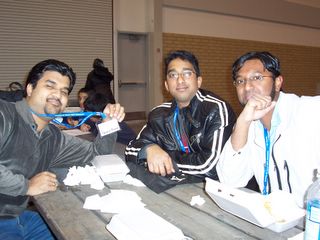"Yes, I know you are headed for the Muslim 'thing' at CNE." The TTC streetcar operator smiled at me. "I will let you know when we arrive."
"Why, thank you very much." I smiled back at her, then got into my seat, wondering how she knew. Then I realized. As the streetcar passed Fort York street, the passengers were me, two other Pakistani guys, and around 20 young women in hijab. I need not have asked the operator, just followed the hijabis.
As the vehicle stopped next to the CNE, the two Pakistani guys decided that the presence of so many women meant they would have to act cool. Unfortunately one slipped on the ice on the streetcar steps and fell straight on his bum. The girls did the un-Islamic thing and some started to laugh. And so I arrived at RIS, the Reviving The Islamic Spirit Conference, Toronto, 2005.
Synopsis of the Day: First session: Bad. Evening Session: Good. Night Sessions: Excellent.
I had missed the morning session, so met up with my friends and slipped straight into the afternoon session, anticipating a good speech by Eric Margolis, my favourite columnist. My mood soon changed, however, as they announced a schedule change. Sheikh Riyadh Ul Haq gave a talk instead, supposedly on something called 'Divisions of Religion'. I say supposedly, as the talk was all over the space. Now I know he is a learned gentleman, but I must say I was disappointed (bored) with this session. First, he provided no examples. He said people are more observant of religion and yet do not practise the essence of religion, yet did not give any example of what he meant. Once he said we can destroy a Muslim neighbour with a sin of the tongue or the ears, and yet did not specify what he meant. I never got it. His tone was serious (angry) throughout, no jokes, no brevity.
And to top it all, when some people politely clapped as he ended his speech, he told them not to clap as it was against Islam?!!! Maybe I don't get it. The Muslim community of North America is in many ways an infant community, still learning its roots, you don't need to make things harder for us. If someone doesn't know how to drive, you don't put him on the highway and tell him to worry about checking the blindspot. You show him where the brake is first, then the accelerator. Read Surah Taha, verse 2-3. Islam has not come to make things hard, but to make it easy. What is wrong with clapping?
This was immediately tackled by the next session. Sheikh Abdallah bin Bayyah was the speaker, and the topic was 'Ignorance and Extremism in the Muslim World'. The only reason I give the session good instead of excellent is because half the sheikh's speech was in Arabic, and translated to English by another person. But what a speech! The content was superb, the examples vivid, and a splendid summary of how ignorance can lead Muslims to either not observing their religion at all, or going to the other extreme and practising a strict but incorrect observance of Islam. The best example he gave was of Caliph Omar, who SUSPENDED the Islamic punishments for stealing in a time of extreme draught in the empire. He recognized the situation and reverted to the spirit of Islamic law, and not the letter. The sheikh also argued that since no recognized Muslim scholar is present in North America to give qualified Shariah rulings, based on not only the letter but spirit of Islam, Shariah law should NOT be implemented in North America, as Shariah could be interpreted falsely. Essentially this is what I argued here.
I only wish he could have spoken in English throughout, so we didn't lose time for translation. Sheikh Abdallah is presently a member of several legal bodies, such as the European Council of Legal opinion and the organization known as Al Majma' al-Fiqhi, the Supreme Fiqh Council, which is comprised of a body of scholars that come together from all over the Muslim world. These scholars represent a variety of madhabs (viewpoints) and study and analyze issues that confront Muslims in the modern world. He also has expertise in a lot of areas that have been ignored, such as the science known as fiqh al-aqaliyaat, juristic rulings related to minority Muslims. Ironically, this learned sheikh resides in Saudi Arabia. The speech he can give in North America on dangers of extremism, a benevolent Shariah and others is a speech he may not be free to give in the cradle of Islam.
And now the final session. Clearly the organizers saved the best speakers for the last. First up was Imam Zaid Shakir, and then Ms. Atalla Shabazz (the daughter of the legendary Malcolm X). They talked about Malcolm X, his life, his achievements as a Muslim, his stance against oppression and discrimination, and what lessons we can draw from him. Both speakers were very good speakers, not only learned but also well versed, and knew how to work the crowd. People clapped their applause (I made sure to clap loudly). The best line they said was Malcolm never let his circumstances limit him, only his potential. It is important, they reminded us, that the first slaves brought over from Africa were Muslims. Their blood and sweat and tears helped form America into the power she is today. So Muslims are no strangers to America (read Alex Haley's Roots, or remember Malcolm X (a former Christian and son of one) was descended from Muslim slaves from Togo). Muslims have been part and parcel of America from the start.
Finally it was the turn of Dr. Zakir Naik. He told us how Islam is wrongly portrayed in the media and why it falls on us to defend Islam and its practises whenever it is wrongly slandered. He gave excellent examples on why Islam is the solution, and not the problem. They call Muslims extremists, but Islam supports being extremely kind, extremely generous, extremely just. They call all Muslims terrorists, but just a policeman strikes terror into the heart of a criminal, all Muslims are required to strike terror into the heart of robbers, thieves, rapists, the unjust, the anti-social elements. He gave practical examples of how verses of the Quran are taken out of context to by many writers (for example Surah Taubah verses 5 and 7, omitting verse 6, and omitting the whole context of the verses 1-4). He told us not to be apologetics. If we don't stand up for ourselves, who will, he asked. Certainly the best speaker of the day.
As I was driving back, the police stopped me for a RIDE check. The lady officer asked me to roll down my window, sniffed, and then asked me if I was drinking. I said no. Then she sniffed again. Then she asked me where I was coming from. The words of Dr. Zakir Naik ringing in my head, I told her very proudly I am coming from a Muslim festival(?) from CNE. OK, she said, sniffed again, and then gave me a brochure on not Drinking and Driving, before wishing me a Happy Holidays and letting me drive off. Why was she sniffing so many times? Maybe the garlic was a bit strong on the shwarma I had at RIS.

The main entrance to CNE against a cloudy sky.

Rows of chairs await attendees for a session at the convention center.

T, Me and S, finishing up some biryani.
Tags: RIS Reviving The Islamic Spirit Muslim Toronto

3 comments:
Allahu akbar, Allhu akbar, Subhanallah, mashallah, jazakallah.
wah wah wah wah
you gotta watch Pat robertson on 700 Club thing to see extreme example of taking verses out of context. He's done such thing that he would take a part out of ONE VERSE. Like seriously! For example, right after 9/11 (don't ask why I watch that) he used this following verse:
9:5 But when the forbidden months are past, then fight and slay the Pagans wherever ye find them, an seize them, beleaguer them, and lie in wait for them in every stratagem (of war); but if they repent, and establish regular prayers and practise regular charity, then open the way for them: for Allah is Oft-forgiving, Most Merciful.
But the only part he used and ranted about was "fight and slay the Pagans wherever ye find them, an seize them, beleaguer them," which ignores the "why's, and when's" of the commands.
thanks for the review.
Thank you for the comments. Yes it was an ... interesting ... experience.
Post a Comment